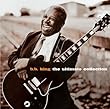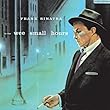 Corinne Bailey Rae’s songs have an infectious romanticism. One recognizes the romanticism—the dreamy lack of realism—and still feels seduced by Rae’s hopeful emotions and evocative situations.
Corinne Bailey Rae’s songs have an infectious romanticism. One recognizes the romanticism—the dreamy lack of realism—and still feels seduced by Rae’s hopeful emotions and evocative situations.
Category: Music reviews
The Thrills Are Here: B.B. King’s The Ultimate Collection
 B.B. King, born September 16, 1925, in the Mississippi Delta, is the king of the blues. His anthology The Ultimate Collection is as good an introduction to the blues as any: and what is notable is the fact that it gives pleasure.
B.B. King, born September 16, 1925, in the Mississippi Delta, is the king of the blues. His anthology The Ultimate Collection is as good an introduction to the blues as any: and what is notable is the fact that it gives pleasure.
Boyish Intensities: Dashboard Confessional’s Dusk and Summer
 There’s a calculated roughness to “Rooftops and Invitations.” It’s interesting that the first songs on the album are fast and loud, and the later songs begin to be slower, more quiet, as if a point was being made with the first songs (the point?—the proof of masculinity).
There’s a calculated roughness to “Rooftops and Invitations.” It’s interesting that the first songs on the album are fast and loud, and the later songs begin to be slower, more quiet, as if a point was being made with the first songs (the point?—the proof of masculinity).
Elegant Rock (Or, Impressing Posterity): The Best of Morrissey and Ringleader of the Tormentors
:format(jpeg):mode_rgb():quality(40)/discogs-images/R-542847-1381650419-8218.jpeg.jpg) Steven Patrick Morrissey is now middle-age. In a culture that does not worship youth so much as pander to it—with all the contempt and desperation and envy that suggests—it is interesting to observe people who are aging well: still feeling, still thinking, still creating, still growing.
Steven Patrick Morrissey is now middle-age. In a culture that does not worship youth so much as pander to it—with all the contempt and desperation and envy that suggests—it is interesting to observe people who are aging well: still feeling, still thinking, still creating, still growing.
Melancholy Meditation: Frank Sinatra’s In the Wee Small Hours
 “I Get Along Without You Very Well” is a song I’m more used to hearing women sing, and it’s interesting to hear Sinatra claim the love and vulnerability in the song. His phrasing is conversational but his tone is musical (he never just sounds as if he’s speaking the lyrics, as some singers do).
“I Get Along Without You Very Well” is a song I’m more used to hearing women sing, and it’s interesting to hear Sinatra claim the love and vulnerability in the song. His phrasing is conversational but his tone is musical (he never just sounds as if he’s speaking the lyrics, as some singers do).
Lightness and Beauty: Skye’s “Tell Me About Your Day”
In “What’s Wrong with Me,” an impressionistic song suggesting resistance to embracing everything in modern life, Skye sings, “I try not to think about the rain /I try not to think about the evil empires and stupid fools.” It is…
Traditions, Transformations: Leela James, A Change Is Gonna Come
Leela James: and her complex aims, one of the beautiful dames, besieged by seductive games, knowing predictability maims, talent names, success tames.… A Change Is Gonna Come has a rich, warm sound—vintage. Within its exploration of love, there’s another interlude, “Married,” in…
A Musician Who Lays Claim to the World: Caetano Veloso’s “Foreign Sound” and his “Best”
 One hears the plucking of guitar strings and orchestral swirls, and Caetano Veloso’s voice is both light and grave. It’s fun to hear him sing Cobain’s “Come As You Are,” which was first recorded by the band Nirvana, and contains sharp contradictions, suggesting not confusion but an aware and complex mind. Veloso uses both a falsetto voice and a low, declamatory voice to interpret “Feelings,” making a song that had become a cabaret cliché sound like a genuine human expression.
One hears the plucking of guitar strings and orchestral swirls, and Caetano Veloso’s voice is both light and grave. It’s fun to hear him sing Cobain’s “Come As You Are,” which was first recorded by the band Nirvana, and contains sharp contradictions, suggesting not confusion but an aware and complex mind. Veloso uses both a falsetto voice and a low, declamatory voice to interpret “Feelings,” making a song that had become a cabaret cliché sound like a genuine human expression.
A review of The Essential Barbra Streisand and Guilty Pleasures
When not practical, and even practicality has its deceptions, many people think in clichés, and even feel in clichés, and at their most rigorous they simply use one cliché to interrogate another, but in every generation, in every age, there are a few original people—and Streisand is original; and she often, if not always, has been fearless in art and politics.
A review of Salt and Dreaming Wide Awake by Lizz Wright
 “My eyes burn, I have seen the glory of a brighter sun,” Wright sings in “Dreaming Wide Awake,” with its limpid beginning. Lizz Wright sings, “Who are you, stranger, to come here, and answer all my prayers?” and one might ask the same thing of her: and I imagine she may spend her entire career answering the question. It is something to look forward to.
“My eyes burn, I have seen the glory of a brighter sun,” Wright sings in “Dreaming Wide Awake,” with its limpid beginning. Lizz Wright sings, “Who are you, stranger, to come here, and answer all my prayers?” and one might ask the same thing of her: and I imagine she may spend her entire career answering the question. It is something to look forward to.